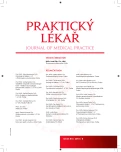Introduction to medical ethics – how to understand Hippocratic tradition today
Authors:
J. Šimek; J. Šimek jr.
Authors‘ workplace:
Vedoucí: prof. JUDr. Aleš Gerloch, CSc.
; Katedra teorie práva a právních učení
; Karlova univerzita v Praze, Právnická fakulta
; Vedoucí: doc. MUDr. Jiří Šimek, CSc.
; Katedra filozofie a etiky v pomáhajících profesích
; Jihočeská univerzita v Českých Budějovicích Zdravotně sociální fakulta
Published in:
Prakt. Lék. 2014; 94(6): 275-278
Category:
Of different specialties
Motto: „Ceterum autem censeo res humanas profundius hoc tempore medicas colendas esse.“
Overview
Authors offer some insights into the role of legislation in democratic society and they consider some possibilities of physicians to affect provisions of health laws. As an example of possible amendments initiated by physicians they cite two provisions of the Law No. 372/2011 Sb., On health services and on conditions of their provision. § 41 „Duties of the patient and other persons“ could inspire hopes, which it could not fulfil. Democratic society does not dispose of measures, which could force the patient to keep therapeutic regime. Authors believe that explicit declaration of the responsibility transfer in the case of non compliance of the patient would be more appropriate. In § 36 „Advance directives“ there is the conflict between strict requirements on elaboration of the advance directives document and the ease of physician’s refusal to follow patient’s directives. § 36 introduce the term „active inflicting of death“. Definition of the term is in conflict with prevailing consensus in bioethics literature and with prevailing consensus in expert’s opinion in West Europe. Provisions of the law do not leave the space for termination of aggressive treatment at the end of life and they force physicians to provide treatment inconsistent with the wish of the patient.
Keywords:
ethics and law – medical ethics – ethics of responsibility in medicine – decision making at the end of life – treatment withholding and withdrawing
Sources
1. Parlament České republiky. Zákon o zdravotních službách a podmínkách jejich poskytování (zákon o zdravotních službách) – Zákon č. 372/2011 Sb. [on-line]. Dostupný z: http://portal.gov.cz/app/zakony/zakonPar.jsp?idBiblio=75500&fulltext=&nr=372~2F2011&part=&name=&rpp=15#local-content.
2. Spolkový soudní dvůr (SRN). Eutanazie přerušením péče. Trestněprávní revue 1/2011, C. Praha: H. Beck 2011; 28.
3. Sulmasy DP. Killing and allowing to die: another look. J Law Med Ethics 1998; 26 : 55–64.
4. The General Medical Council. Treatment and care towards the end of life: good practice in decision making. London: GMC, 2010. Dostupné z: http://www.gmc-uk.org/Treatment_and_care_towards_the_end_of_life_English_0513.pdf_48902105.pdf.
5. Černý V, Cvachovec K, Pařízková R, a kol. Konsenzuální stanovisko k poskytování paliativní péče u nemocných s nezvratným orgánovým selháním. Vnitř. Lék. 2009; (55)9; 846–849.
6. Česká lékařská komora. Doporučení představenstva ČLK č. 1/2010 K postupu při rozhodování o změně léčby intenzivní na léčbu paliativní u pacientů v terminálním stavu, kteří nejsou schopni vyjádřit svou vůli. Legislativa ČLK, ČLK Praha, 2010. Dostupné z: http://merkur4.issa.cz/nw/www.lkcr-old.cz/document3.php?param=news_file,NEWS_FILE_ID,,TYPE,NAME,DATE_AKT&id=89222.
7. Šimek J, Schimek F. Čeští anesteziologové, nenasazení a vysazení léčby. Vita nostra revue 1999; 8(3): 61–63.
8. Schimek F, Černý V, Cvachovec K, a kol. Attitudes des professionnels de sante en Tchequie vis a vis de l’abstention ou de la suppression des traitements en reanimation. (Abstract). Ann Fr Anesth Réanim 2000; 19(Suppl 1): 257.
Labels
General practitioner for children and adolescents General practitioner for adultsArticle was published in
General Practitioner

2014 Issue 6
- Advances in the Treatment of Myasthenia Gravis on the Horizon
- Hope Awakens with Early Diagnosis of Parkinson's Disease Based on Skin Odor
- Memantine in Dementia Therapy – Current Findings and Possible Future Applications
- Memantine Eases Daily Life for Patients and Caregivers
- Possibilities of Using Metamizole in the Treatment of Acute Primary Headaches
-
All articles in this issue
- Idiopathic orbital pseudotumour
- Myocardial infarction as the first symptom of essential thrombocythemia in a young man
- Dysphagia associated with neurological disorders
-
Vaccination and its role in prevention of infectious diseases.
A vaccination refusal – a serious problem of public health - Occupational diseases reported in the Czech Republic in 2013
- Patient’s safety at operating theatre in Czech and Swedish hospitals
- Introduction to medical ethics – how to understand Hippocratic tradition today
- General Practitioner
- Journal archive
- Current issue
- About the journal
Most read in this issue
- Dysphagia associated with neurological disorders
- Idiopathic orbital pseudotumour
- Patient’s safety at operating theatre in Czech and Swedish hospitals
-
Vaccination and its role in prevention of infectious diseases.
A vaccination refusal – a serious problem of public health
